Module 12 Unit 3 Language in use重点知识归纳和语法 讲解练习(含答案)
文档属性
| 名称 | Module 12 Unit 3 Language in use重点知识归纳和语法 讲解练习(含答案) |
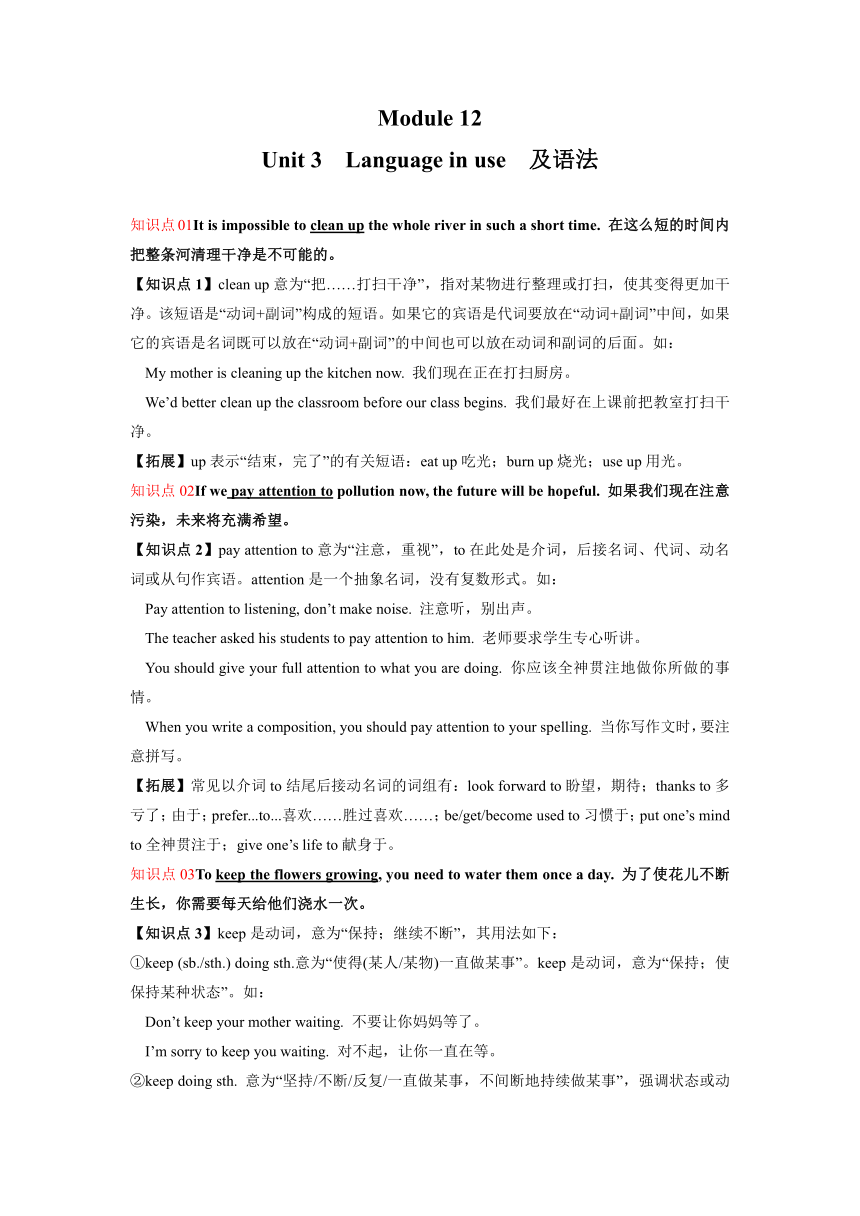
|
|
| 格式 | zip | ||
| 文件大小 | 184.9KB | ||
| 资源类型 | 教案 | ||
| 版本资源 | 外研版 | ||
| 科目 | 英语 | ||
| 更新时间 | 2023-01-17 09:39:29 | ||
图片预览

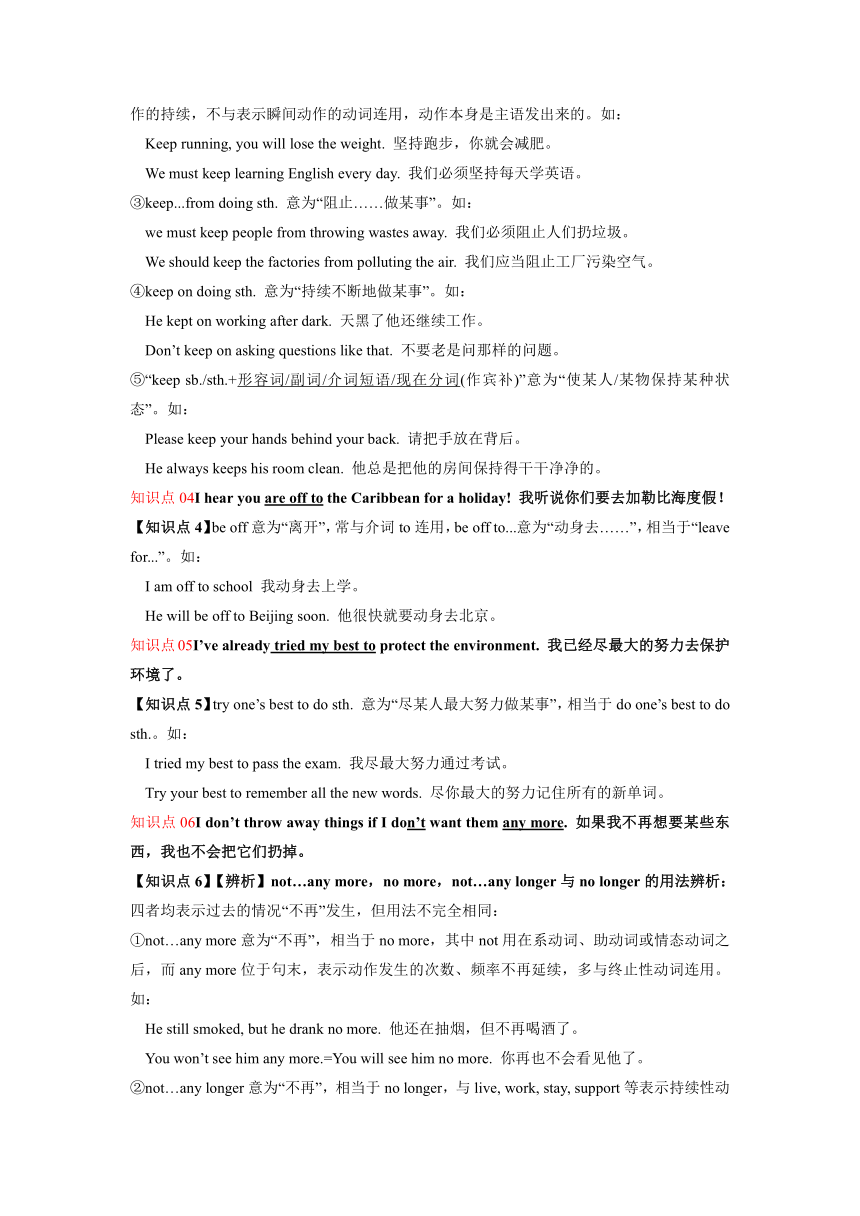
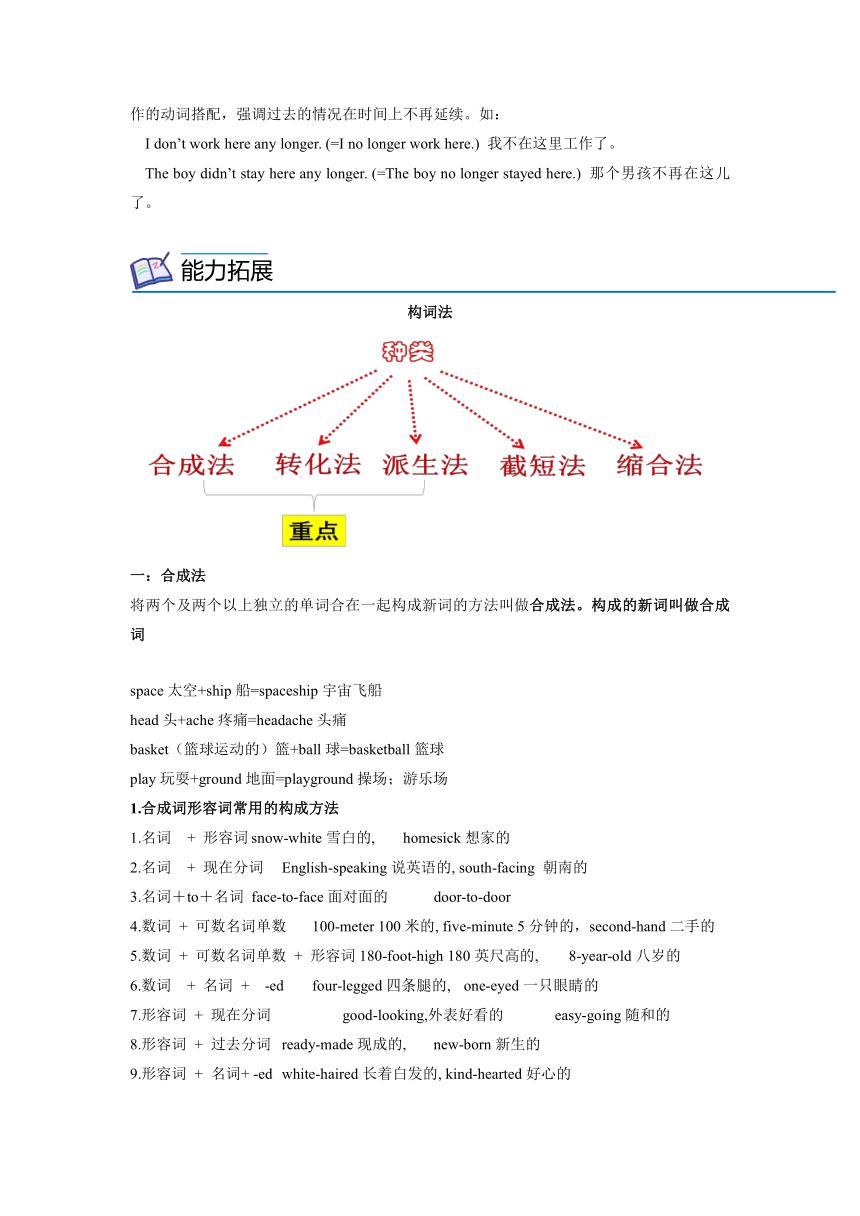
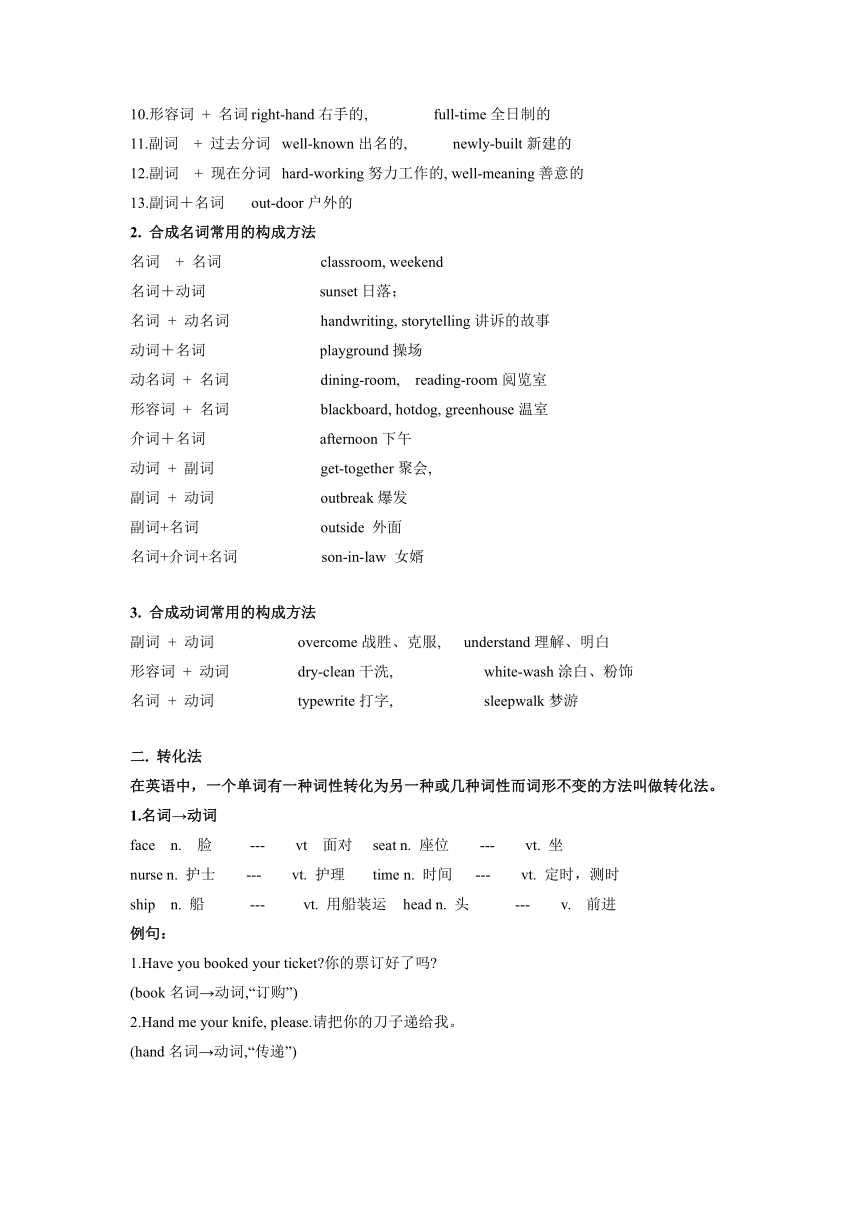
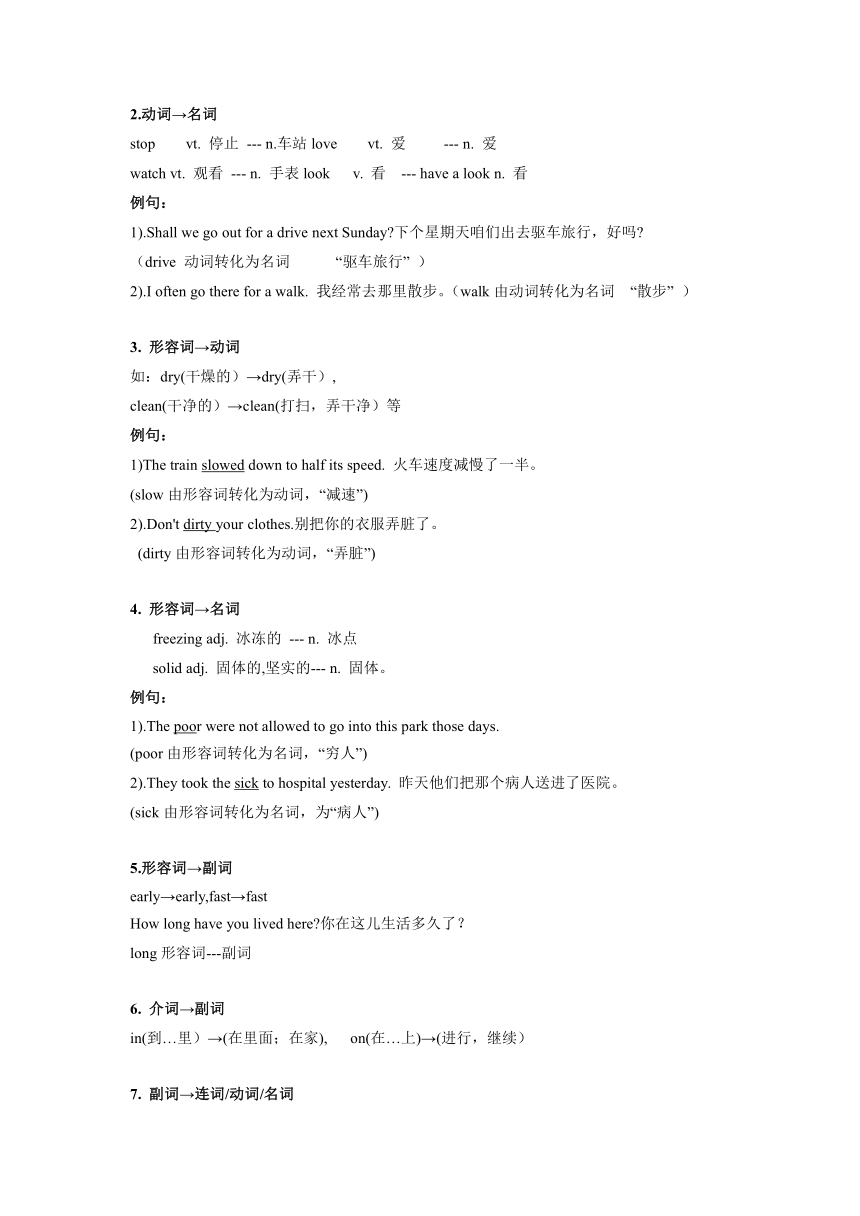
文档简介
Module 12
Unit 3 Language in use 及语法
知识点01It is impossible to clean up the whole river in such a short time. 在这么短的时间内把整条河清理干净是不可能的。
【知识点1】clean up意为“把……打扫干净”,指对某物进行整理或打扫,使其变得更加干净。该短语是“动词+副词”构成的短语。如果它的宾语是代词要放在“动词+副词”中间,如果它的宾语是名词既可以放在“动词+副词”的中间也可以放在动词和副词的后面。如:
My mother is cleaning up the kitchen now. 我们现在正在打扫厨房。
We’d better clean up the classroom before our class begins. 我们最好在上课前把教室打扫干净。
【拓展】up表示“结束,完了”的有关短语:eat up吃光;burn up烧光;use up用光。
知识点02If we pay attention to pollution now, the future will be hopeful. 如果我们现在注意污染,未来将充满希望。
【知识点2】pay attention to意为“注意,重视”,to在此处是介词,后接名词、代词、动名词或从句作宾语。attention是一个抽象名词,没有复数形式。如:
Pay attention to listening, don’t make noise. 注意听,别出声。
The teacher asked his students to pay attention to him. 老师要求学生专心听讲。
You should give your full attention to what you are doing. 你应该全神贯注地做你所做的事情。
When you write a composition, you should pay attention to your spelling. 当你写作文时,要注意拼写。
【拓展】常见以介词to结尾后接动名词的词组有:look forward to盼望,期待;thanks to多亏了;由于;prefer...to...喜欢……胜过喜欢……;be/get/become used to习惯于;put one’s mind to全神贯注于;give one’s life to献身于。
知识点03To keep the flowers growing, you need to water them once a day. 为了使花儿不断生长,你需要每天给他们浇水一次。
【知识点3】keep是动词,意为“保持;继续不断”,其用法如下:
①keep (sb./sth.) doing sth.意为“使得(某人/某物)一直做某事”。keep是动词,意为“保持;使保持某种状态”。如:
Don’t keep your mother waiting. 不要让你妈妈等了。
I’m sorry to keep you waiting. 对不起,让你一直在等。
②keep doing sth. 意为“坚持/不断/反复/一直做某事,不间断地持续做某事”,强调状态或动作的持续,不与表示瞬间动作的动词连用,动作本身是主语发出来的。如:
Keep running, you will lose the weight. 坚持跑步,你就会减肥。
We must keep learning English every day. 我们必须坚持每天学英语。
③keep...from doing sth. 意为“阻止……做某事”。如:
we must keep people from throwing wastes away. 我们必须阻止人们扔垃圾。
We should keep the factories from polluting the air. 我们应当阻止工厂污染空气。
④keep on doing sth. 意为“持续不断地做某事”。如:
He kept on working after dark. 天黑了他还继续工作。
Don’t keep on asking questions like that. 不要老是问那样的问题。
⑤“keep sb./sth.+形容词/副词/介词短语/现在分词(作宾补)”意为“使某人/某物保持某种状态”。如:
Please keep your hands behind your back. 请把手放在背后。
He always keeps his room clean. 他总是把他的房间保持得干干净净的。
知识点04I hear you are off to the Caribbean for a holiday! 我听说你们要去加勒比海度假!
【知识点4】be off意为“离开”,常与介词to连用,be off to...意为“动身去……”,相当于“leave for...”。如:
I am off to school 我动身去上学。
He will be off to Beijing soon. 他很快就要动身去北京。
知识点05I’ve already tried my best to protect the environment. 我已经尽最大的努力去保护环境了。
【知识点5】try one’s best to do sth. 意为“尽某人最大努力做某事”,相当于do one’s best to do sth.。如:
I tried my best to pass the exam. 我尽最大努力通过考试。
Try your best to remember all the new words. 尽你最大的努力记住所有的新单词。
知识点06I don’t throw away things if I don’t want them any more. 如果我不再想要某些东西,我也不会把它们扔掉。
【知识点6】【辨析】not…any more,no more,not…any longer与no longer的用法辨析:四者均表示过去的情况“不再”发生,但用法不完全相同:
①not…any more意为“不再”,相当于no more,其中not用在系动词、助动词或情态动词之后,而any more位于句末,表示动作发生的次数、频率不再延续,多与终止性动词连用。如:
He still smoked, but he drank no more. 他还在抽烟,但不再喝酒了。
You won’t see him any more.=You will see him no more. 你再也不会看见他了。
②not…any longer意为“不再”,相当于no longer,与live, work, stay, support等表示持续性动作的动词搭配,强调过去的情况在时间上不再延续。如:
I don’t work here any longer. (=I no longer work here.) 我不在这里工作了。
The boy didn’t stay here any longer. (=The boy no longer stayed here.) 那个男孩不再在这儿了。
构词法
一:合成法
将两个及两个以上独立的单词合在一起构成新词的方法叫做合成法。构成的新词叫做合成词
space太空+ship船=spaceship宇宙飞船
head头+ache疼痛=headache头痛
basket(篮球运动的)篮+ball球=basketball篮球
play玩耍+ground地面=playground操场;游乐场
1.合成词形容词常用的构成方法
1.名词 + 形容词 snow-white雪白的, homesick想家的
2.名词 + 现在分词 English-speaking说英语的, south-facing 朝南的
3.名词+to+名词 face to face面对面的 door-to-door
4.数词 + 可数名词单数 100-meter 100米的, five-minute 5分钟的,second-hand二手的
5.数词 + 可数名词单数 + 形容词180-foot-high 180英尺高的, 8-year-old八岁的
6.数词 + 名词 + -ed four-legged四条腿的, one-eyed一只眼睛的
7.形容词 + 现在分词 good-looking,外表好看的 easy-going随和的
8.形容词 + 过去分词 ready-made现成的, new-born新生的
9.形容词 + 名词+ -ed white-haired长着白发的, kind-hearted好心的
10.形容词 + 名词 right-hand右手的, full-time全日制的
11.副词 + 过去分词 well-known出名的, newly-built新建的
12.副词 + 现在分词 hard-working努力工作的, well-meaning善意的
13.副词+名词 out-door户外的
2. 合成名词常用的构成方法
名词 + 名词 classroom, weekend
名词+动词 sunset日落;
名词 + 动名词 handwriting, storytelling讲诉的故事
动词+名词 playground操场
动名词 + 名词 dining-room, reading-room阅览室
形容词 + 名词 blackboard, hotdog, greenhouse温室
介词+名词 afternoon下午
动词 + 副词 get-together聚会,
副词 + 动词 outbreak爆发
副词+名词 outside 外面
名词+介词+名词 son-in-law 女婿
3. 合成动词常用的构成方法
副词 + 动词 overcome战胜、克服, understand理解、明白
形容词 + 动词 dry-clean干洗, white-wash涂白、粉饰
名词 + 动词 typewrite打字, sleepwalk梦游
二. 转化法
在英语中,一个单词有一种词性转化为另一种或几种词性而词形不变的方法叫做转化法。
1.名词→动词
face n. 脸 --- vt 面对 seat n. 座位 --- vt. 坐 nurse n. 护士 --- vt. 护理 time n. 时间 --- vt. 定时,测时
ship n. 船 --- vt. 用船装运 head n. 头 --- v. 前进
例句:
1.Have you booked your ticket 你的票订好了吗
(book名词→动词,“订购”)
2.Hand me your knife, please.请把你的刀子递给我。
(hand名词→动词,“传递”)
2.动词→名词
stop vt. 停止 --- n.车站love vt. 爱 --- n. 爱
watch vt. 观看 --- n. 手表look v. 看 --- have a look n. 看
例句:
1).Shall we go out for a drive next Sunday 下个星期天咱们出去驱车旅行,好吗
(drive 动词转化为名词 “驱车旅行” )
2).I often go there for a walk. 我经常去那里散步。(walk由动词转化为名词 “散步” )
3. 形容词→动词
如:dry(干燥的)→dry(弄干),
clean(干净的)→clean(打扫,弄干净)等
例句:
1)The train slowed down to half its speed. 火车速度减慢了一半。
(slow由形容词转化为动词,“减速”)
2).Don't dirty your clothes.别把你的衣服弄脏了。
(dirty由形容词转化为动词,“弄脏”)
4. 形容词→名词
freezing adj. 冰冻的 --- n. 冰点
solid adj. 固体的,坚实的--- n. 固体。
例句:
1).The poor were not allowed to go into this park those days.
(poor由形容词转化为名词,“穷人”)
2).They took the sick to hospital yesterday. 昨天他们把那个病人送进了医院。
(sick由形容词转化为名词,为“病人”)
5.形容词→副词
early→early,fast→fast
How long have you lived here 你在这儿生活多久了?
long形容词---副词
6. 介词→副词
in(到…里)→(在里面;在家), on(在…上)→(进行,继续)
7. 副词→连词/动词/名词
when adv.什么时候→conj.当……时候;
down adv. 向下 → v. 放下
nowhere adv. 任何地方都不→ n. 无处,无名的地方
8.数词→动词/名词
second num. 第二 --- v. 赞成 --- n. 秒
9. 有些词可以词形不变,只因重音变化而发生词类转化,有时词义也可能变化。
record [ rek d] v.记录 record [r k d] n.记录
10. 有些词词形不变,只因词尾的清浊音变化而发生词类转化,有时词形也可以变化。
excuse [ ks kju z] v.原谅 excuse [ ks kju s] n.原谅 use [ju z] v.用 use [ju s] n.用
3. 派生法:
一、派生法
(一)前缀
1、表示否定意义的前缀:
(1)纯否定前缀:
* un- unhappy, unfair, unknown, unhealthy, unlucky
* dis- dislike, disagree, disappear
* im- impossible, impolite
(2)表示错误的意义:
* mis- mistake, misunderstanding
2、表示空间位置,方向关系的前缀:
(1)a- 表示“在……之上”,“向……”:
aboard, aside
(2)fore- 表示“在前面”:
forehead, foreleg
(3)inter- 表示“在……间,相互”:
international, interaction, internet, interview
(4)out- 表示“在外部,在外:”
outline, outside, outward(s), outdoor(s)
(5)super- 表示“在…..之上,超级”:
superhero, superman
(6)trans- 表示“移上,转上,在那一边”:
translate, transplant, transportation
(7)under- 表示“在…..下面,下的”:
underline, underground
(8)up- 表示“向上,向上面,在上”:
upward(s), upload
(9)tele- 表示“远离”:
television, telephone
3、表示时间,序列关系的前缀:
(1) mid- 表示“中,中间”:
midnight, midsummer, mid-day, mid-autumn
(2)re- 表示“再一次,重新”,“回应”:
retell, rewrite, reuse, recycle, rebuild, react
4、表示某种状态,构成形容词、副词或动词:
* a- afraid, alive, alone, asleep, ashamed, aloud, ahead, aside, alike, awake
5、表示“自我”:
* self- self-protect(ion), self-made
5、表示变换词类作用的前缀:
* en- enable, enrich, enlarge, encourage
6、 表示数量关系的前缀:
(1) 表示“单一”,“一”:
* uni- uniform
(2) 表示“二,两,双”:
* bi- bicycle
(3) 表示“百,百分之一”:
* centi- centimeter
(4) 表示“千,千分之一”:
* kilo- kilometer, kilogram
(5) 表示“微小、微型”:
* mini- minibus, miniskirt
(二)后缀
1、名词后缀:
(1) 具有某种职业或动作的人:
* -an, -ian, -ician 表示“……地方的人,精通……的人”American, Asian, Australian, Russian, Italian , librarian, musician
* -ant,-ent 表示“……人” servant, assistant, agent, student
* -eer 表示“从事于……人” engineer, volunteer
* -er 表示“从事某种职业的人, 某地区,地方的人” singer, driver, writer, speaker, traveler
* -or 表示“……者” doctor, operator, actor, visitor, inventor, educator
* -ar, -ary 表示“……的人, 从事……的人” scholar, beggar, secretary
*-ese 表示“ ……国人,……地方的人”Chinese, Japanese
* -ess 表示“阴性人称名词” actress, hostess
* -ist 表示“从事……研究者,信仰……主义者” dentist, artist
(2)构成具有抽象名词的含义:
* -age 表示“状态,行为,身份及其结果,总称” courage, marriage
* -ance, -ence 表示“性质,状况,行为,过程,总量,程度”importance, appearance, performance, difference, absence, presence
* -bility 表示“动作,性质,状态” ability, possibility, probability
* -dom 表示“等级,领域,状态” freedom, wisdom
* -ery, -ry 表示“行为,状态,习性,性质” bravery, discovery
* -hood 表示“资格,身份, 年纪,状态” childhood, girlhood, boyhood
* -ing 表示“动作的过程,结果” building, writing, learning
* -ion, -tion, -ation, -ition, -sion 表示“行为的过程,结果,状况” action, invention, pronunciation, examination, decision
* -ment 表示“行为,状态,过程,手段及其结果” movement, agreement, development
* -ness 表示“性质,状态,程度” kindness, illness, happiness
* -ship 表示“情况,性质,技巧,技能及身份,职业” relationship, friendship
* -th, 表示“动作,性质,过程,状态” truth, growth , youth
2、 形容词后缀:
(1)带有“属性,倾向,相关”的含义:
* -able, -ible comfortable, enjoyable, sociable, terrible
* -al natural, national
* -ant, -ent important, excellent
* -ing(表示特征:令人觉得) moving, interesting, exciting
* -ed (表示情绪:觉得)pleased, interested, surprised
* -ive active, creative, expensive
(2) 表示“相象,类似”的含义:
* -y cloudy, sunny, windy, rainy, foggy, healthy, dirty, lucky, noisy
* -ly friendly, lonely, lovely, lively
(3)表示“充分的”含义:
* -ful beautiful, wonderful, helpful, useful, careful
* -ous dangerous, humorous
(4)表示由某种物质形成,制成或生产的含义:
* -en wooden, golden
(5)表示方向的含义:
* -ern eastern, eastern, western, southern, northern, southeastern, northwestern
* -ward downward, forward
(6)表示“数量关系”的含义:
* -teen thirteen
* -ty fifty
* -th fourth, fiftieth
(7)表示否定:
* -less useless, endless, hopeless
3、动词后缀:
* -ize, ise 表示“做成,变成,……化” organize, realize
* -en 表示“使成为,引起,使有” quicken, weaken, soften, harden
4、副词后缀:
* -ly possibly, simply, truly
* -ward, -wards downward, inwards, upward
题组A 基础过关练
Ⅰ.根据句意及汉语提示完成单词
1.Even the simplest everyday activities can (减少)pollution.
2.All of our economies depend on (石油).
3.My computer doesn't work.I have to get somebody to (修理)it.
4.Our foreign (政策)leans toward the third world.
5.If we look after the earth well,our future won't be (没希望的).
【答案】1.reduce2.oil3.repair4.policy5.hopeless
Ⅱ.用方框中所给单词的适当形式填空
1.It's very of you to speak to your teacher like that,and it will hurt her.
2.The noise can make people angry easily.
3. We'd better use paper.It can help save trees.
4.We should use china cups because we can them.
5.We are producing waste every day and it's to our environment.
【答案】1.impolite2.pollution3.recycled4.reuse5.harmful
题组B 能力提升练
根据短文内容和括号内所给汉语意思,写出空白处各单词的正确形式(每空一词)。
When you see people throw __1__(吨)of __2__(垃圾)away each year,are you worried about our world?I believe you are worried about__3__(可怕的)things happening every day.If the rivers are __4__(污染),farmers can't use the water for their __5__(庄稼).Pollution from __6__(工厂)may even __7__(杀死)people in some places.Pollution has become one of our greatest __8__(敌人).
So is the world really __9__(无望的)?I don't think so.If we can take __10__(措施)to reduce pollution from now on,the beautiful world will come back.
【答案】1.tons2.rubbish3.terrible 4.polluted5.crops6factories7.kill8.enemies9.hopeless10.steps
题组C 培优拔尖练
阅读下面短文,按照句子结构的语法性和上下文连贯的要求,在空白处填入一个适当的词或使用括号中词语的正确形式填空。
There are many kinds of pollution around us,such as air pollution,soil pollution,noise pollution and light pollution.They are bad __1__ our health in many ways.
Burning gas,oil and coal __2__(create)air pollution.It can cause sore eyes and breathing problems.
With the increase of pollution and the __3__(develop)of industry(工业),litter is everywhere.It makes our environment dirty.People put lots of rubbish in the land.Farmers use too many chemicals in __4__ fields.They destroy(破坏)the soil.__5__ soil pollution has become serious.
Noise pollution can make people deaf.For example,people may lose their hearing if they work in a __6__(noise)place for a long time.Too __7__(many)noise can cause high blood pressure(高血压)as well.
Working for a long time in strong,changeable light may cause some kinds of __8__(illness).It makes people feel terrible and is __9__(especial)bad for the eyes.
With less pollution,our planet __10__(become)greener and our health will be better.Let's be greener people.
【答案】1.for2.creates3.development4.the5.So6.noisy7.much8.illnesses9.especially10.will become
The train started moving. It was packed with people of all ages. Most of them were working men and women and young college boys and girls. Near the 1 sat an old man with his son, who looked about thirty years old. As the train moved, the son was filled with 2 because he was very excited to see the scenery(景色) outside. “See Dad, the green trees are very beautiful!” It made the other people feel very 3 . They started talking about the old man’s son in a low voice.
Suddenly, it started raining. Raindrops fell on the travelers 4 the opened window. Seeing the rain, the old man’s son said 5 , “See Dad, how beautiful the rain is!” Hearing these words, a young lady became angry with the man 6 the raindrops were dropping on her new dress. She shouted at the noisy son and 7 father, “Can’t you see it is raining You! Old man! If your son is not normal, get him to a hospital quickly!”
The old man didn’t 8 anything at first. Then he replied in a low voice, “We are on the way back home from the hospital. He was 9 at birth, and he only got his vision(视力)last week. 10 is new to him. Please excuse us for the trouble.” All the other people became quiet.
1.A.gate B.train C.window D.station
2.A.joy B.air C.pity D.shame
3.A.proud B.lonely C.strange D.relaxed
4.A.at B.from C.across D.through
5.A.politely B.happily C.easily D.angrily
6.A.so B.but C.and D.because
7.A.my B.his C.her D.your
8.A.say B.eat C.see D.know
9.A.deaf B.blind C.clever D.stupid
10.A.Somebody B.Anybody C.Everything D.Nothing
1.【答案】C
【解析】根据后面一句,他能看到外面的景色可知,他们坐在窗户旁。故选C。
【答案】A
【解析】根据后文他看到外面的景色很激动,可知这个人很高兴。joy是名词,意为“喜悦”。
3.【答案】C
【解析】根据上下文判断,他的行为让他人感到很奇怪,引起了别人的议论。strange奇怪的。
4.【答案】D
【解析】固定搭配through the window意为“透过窗户”。故选D。
5.【答案】B
【解析】根据说话的语气可以判断,老人的儿子很高兴。故选B。
6.【答案】D
【解析】根据上下文判断,雨点落到女士的新连衣裙上和她生气之间是因果关系,故选D。
7.【答案】B
【解析】本句的father指的是那个儿子的爸爸,用形容词性物主代词his。
8.【答案】A
【解析】根据上下文可知,老人一开始什么也没有说。故选A。
9.【答案】B
【解析】根据后文可知,老人的儿子上周才有视力,说明他以前是个盲人。故选B。
10.【答案】C
【解析】根据句意可知,对于刚刚能看见的人来说,一切都是新鲜的。故选C。
能力拓展
分层提分
Unit 3 Language in use 及语法
知识点01It is impossible to clean up the whole river in such a short time. 在这么短的时间内把整条河清理干净是不可能的。
【知识点1】clean up意为“把……打扫干净”,指对某物进行整理或打扫,使其变得更加干净。该短语是“动词+副词”构成的短语。如果它的宾语是代词要放在“动词+副词”中间,如果它的宾语是名词既可以放在“动词+副词”的中间也可以放在动词和副词的后面。如:
My mother is cleaning up the kitchen now. 我们现在正在打扫厨房。
We’d better clean up the classroom before our class begins. 我们最好在上课前把教室打扫干净。
【拓展】up表示“结束,完了”的有关短语:eat up吃光;burn up烧光;use up用光。
知识点02If we pay attention to pollution now, the future will be hopeful. 如果我们现在注意污染,未来将充满希望。
【知识点2】pay attention to意为“注意,重视”,to在此处是介词,后接名词、代词、动名词或从句作宾语。attention是一个抽象名词,没有复数形式。如:
Pay attention to listening, don’t make noise. 注意听,别出声。
The teacher asked his students to pay attention to him. 老师要求学生专心听讲。
You should give your full attention to what you are doing. 你应该全神贯注地做你所做的事情。
When you write a composition, you should pay attention to your spelling. 当你写作文时,要注意拼写。
【拓展】常见以介词to结尾后接动名词的词组有:look forward to盼望,期待;thanks to多亏了;由于;prefer...to...喜欢……胜过喜欢……;be/get/become used to习惯于;put one’s mind to全神贯注于;give one’s life to献身于。
知识点03To keep the flowers growing, you need to water them once a day. 为了使花儿不断生长,你需要每天给他们浇水一次。
【知识点3】keep是动词,意为“保持;继续不断”,其用法如下:
①keep (sb./sth.) doing sth.意为“使得(某人/某物)一直做某事”。keep是动词,意为“保持;使保持某种状态”。如:
Don’t keep your mother waiting. 不要让你妈妈等了。
I’m sorry to keep you waiting. 对不起,让你一直在等。
②keep doing sth. 意为“坚持/不断/反复/一直做某事,不间断地持续做某事”,强调状态或动作的持续,不与表示瞬间动作的动词连用,动作本身是主语发出来的。如:
Keep running, you will lose the weight. 坚持跑步,你就会减肥。
We must keep learning English every day. 我们必须坚持每天学英语。
③keep...from doing sth. 意为“阻止……做某事”。如:
we must keep people from throwing wastes away. 我们必须阻止人们扔垃圾。
We should keep the factories from polluting the air. 我们应当阻止工厂污染空气。
④keep on doing sth. 意为“持续不断地做某事”。如:
He kept on working after dark. 天黑了他还继续工作。
Don’t keep on asking questions like that. 不要老是问那样的问题。
⑤“keep sb./sth.+形容词/副词/介词短语/现在分词(作宾补)”意为“使某人/某物保持某种状态”。如:
Please keep your hands behind your back. 请把手放在背后。
He always keeps his room clean. 他总是把他的房间保持得干干净净的。
知识点04I hear you are off to the Caribbean for a holiday! 我听说你们要去加勒比海度假!
【知识点4】be off意为“离开”,常与介词to连用,be off to...意为“动身去……”,相当于“leave for...”。如:
I am off to school 我动身去上学。
He will be off to Beijing soon. 他很快就要动身去北京。
知识点05I’ve already tried my best to protect the environment. 我已经尽最大的努力去保护环境了。
【知识点5】try one’s best to do sth. 意为“尽某人最大努力做某事”,相当于do one’s best to do sth.。如:
I tried my best to pass the exam. 我尽最大努力通过考试。
Try your best to remember all the new words. 尽你最大的努力记住所有的新单词。
知识点06I don’t throw away things if I don’t want them any more. 如果我不再想要某些东西,我也不会把它们扔掉。
【知识点6】【辨析】not…any more,no more,not…any longer与no longer的用法辨析:四者均表示过去的情况“不再”发生,但用法不完全相同:
①not…any more意为“不再”,相当于no more,其中not用在系动词、助动词或情态动词之后,而any more位于句末,表示动作发生的次数、频率不再延续,多与终止性动词连用。如:
He still smoked, but he drank no more. 他还在抽烟,但不再喝酒了。
You won’t see him any more.=You will see him no more. 你再也不会看见他了。
②not…any longer意为“不再”,相当于no longer,与live, work, stay, support等表示持续性动作的动词搭配,强调过去的情况在时间上不再延续。如:
I don’t work here any longer. (=I no longer work here.) 我不在这里工作了。
The boy didn’t stay here any longer. (=The boy no longer stayed here.) 那个男孩不再在这儿了。
构词法
一:合成法
将两个及两个以上独立的单词合在一起构成新词的方法叫做合成法。构成的新词叫做合成词
space太空+ship船=spaceship宇宙飞船
head头+ache疼痛=headache头痛
basket(篮球运动的)篮+ball球=basketball篮球
play玩耍+ground地面=playground操场;游乐场
1.合成词形容词常用的构成方法
1.名词 + 形容词 snow-white雪白的, homesick想家的
2.名词 + 现在分词 English-speaking说英语的, south-facing 朝南的
3.名词+to+名词 face to face面对面的 door-to-door
4.数词 + 可数名词单数 100-meter 100米的, five-minute 5分钟的,second-hand二手的
5.数词 + 可数名词单数 + 形容词180-foot-high 180英尺高的, 8-year-old八岁的
6.数词 + 名词 + -ed four-legged四条腿的, one-eyed一只眼睛的
7.形容词 + 现在分词 good-looking,外表好看的 easy-going随和的
8.形容词 + 过去分词 ready-made现成的, new-born新生的
9.形容词 + 名词+ -ed white-haired长着白发的, kind-hearted好心的
10.形容词 + 名词 right-hand右手的, full-time全日制的
11.副词 + 过去分词 well-known出名的, newly-built新建的
12.副词 + 现在分词 hard-working努力工作的, well-meaning善意的
13.副词+名词 out-door户外的
2. 合成名词常用的构成方法
名词 + 名词 classroom, weekend
名词+动词 sunset日落;
名词 + 动名词 handwriting, storytelling讲诉的故事
动词+名词 playground操场
动名词 + 名词 dining-room, reading-room阅览室
形容词 + 名词 blackboard, hotdog, greenhouse温室
介词+名词 afternoon下午
动词 + 副词 get-together聚会,
副词 + 动词 outbreak爆发
副词+名词 outside 外面
名词+介词+名词 son-in-law 女婿
3. 合成动词常用的构成方法
副词 + 动词 overcome战胜、克服, understand理解、明白
形容词 + 动词 dry-clean干洗, white-wash涂白、粉饰
名词 + 动词 typewrite打字, sleepwalk梦游
二. 转化法
在英语中,一个单词有一种词性转化为另一种或几种词性而词形不变的方法叫做转化法。
1.名词→动词
face n. 脸 --- vt 面对 seat n. 座位 --- vt. 坐 nurse n. 护士 --- vt. 护理 time n. 时间 --- vt. 定时,测时
ship n. 船 --- vt. 用船装运 head n. 头 --- v. 前进
例句:
1.Have you booked your ticket 你的票订好了吗
(book名词→动词,“订购”)
2.Hand me your knife, please.请把你的刀子递给我。
(hand名词→动词,“传递”)
2.动词→名词
stop vt. 停止 --- n.车站love vt. 爱 --- n. 爱
watch vt. 观看 --- n. 手表look v. 看 --- have a look n. 看
例句:
1).Shall we go out for a drive next Sunday 下个星期天咱们出去驱车旅行,好吗
(drive 动词转化为名词 “驱车旅行” )
2).I often go there for a walk. 我经常去那里散步。(walk由动词转化为名词 “散步” )
3. 形容词→动词
如:dry(干燥的)→dry(弄干),
clean(干净的)→clean(打扫,弄干净)等
例句:
1)The train slowed down to half its speed. 火车速度减慢了一半。
(slow由形容词转化为动词,“减速”)
2).Don't dirty your clothes.别把你的衣服弄脏了。
(dirty由形容词转化为动词,“弄脏”)
4. 形容词→名词
freezing adj. 冰冻的 --- n. 冰点
solid adj. 固体的,坚实的--- n. 固体。
例句:
1).The poor were not allowed to go into this park those days.
(poor由形容词转化为名词,“穷人”)
2).They took the sick to hospital yesterday. 昨天他们把那个病人送进了医院。
(sick由形容词转化为名词,为“病人”)
5.形容词→副词
early→early,fast→fast
How long have you lived here 你在这儿生活多久了?
long形容词---副词
6. 介词→副词
in(到…里)→(在里面;在家), on(在…上)→(进行,继续)
7. 副词→连词/动词/名词
when adv.什么时候→conj.当……时候;
down adv. 向下 → v. 放下
nowhere adv. 任何地方都不→ n. 无处,无名的地方
8.数词→动词/名词
second num. 第二 --- v. 赞成 --- n. 秒
9. 有些词可以词形不变,只因重音变化而发生词类转化,有时词义也可能变化。
record [ rek d] v.记录 record [r k d] n.记录
10. 有些词词形不变,只因词尾的清浊音变化而发生词类转化,有时词形也可以变化。
excuse [ ks kju z] v.原谅 excuse [ ks kju s] n.原谅 use [ju z] v.用 use [ju s] n.用
3. 派生法:
一、派生法
(一)前缀
1、表示否定意义的前缀:
(1)纯否定前缀:
* un- unhappy, unfair, unknown, unhealthy, unlucky
* dis- dislike, disagree, disappear
* im- impossible, impolite
(2)表示错误的意义:
* mis- mistake, misunderstanding
2、表示空间位置,方向关系的前缀:
(1)a- 表示“在……之上”,“向……”:
aboard, aside
(2)fore- 表示“在前面”:
forehead, foreleg
(3)inter- 表示“在……间,相互”:
international, interaction, internet, interview
(4)out- 表示“在外部,在外:”
outline, outside, outward(s), outdoor(s)
(5)super- 表示“在…..之上,超级”:
superhero, superman
(6)trans- 表示“移上,转上,在那一边”:
translate, transplant, transportation
(7)under- 表示“在…..下面,下的”:
underline, underground
(8)up- 表示“向上,向上面,在上”:
upward(s), upload
(9)tele- 表示“远离”:
television, telephone
3、表示时间,序列关系的前缀:
(1) mid- 表示“中,中间”:
midnight, midsummer, mid-day, mid-autumn
(2)re- 表示“再一次,重新”,“回应”:
retell, rewrite, reuse, recycle, rebuild, react
4、表示某种状态,构成形容词、副词或动词:
* a- afraid, alive, alone, asleep, ashamed, aloud, ahead, aside, alike, awake
5、表示“自我”:
* self- self-protect(ion), self-made
5、表示变换词类作用的前缀:
* en- enable, enrich, enlarge, encourage
6、 表示数量关系的前缀:
(1) 表示“单一”,“一”:
* uni- uniform
(2) 表示“二,两,双”:
* bi- bicycle
(3) 表示“百,百分之一”:
* centi- centimeter
(4) 表示“千,千分之一”:
* kilo- kilometer, kilogram
(5) 表示“微小、微型”:
* mini- minibus, miniskirt
(二)后缀
1、名词后缀:
(1) 具有某种职业或动作的人:
* -an, -ian, -ician 表示“……地方的人,精通……的人”American, Asian, Australian, Russian, Italian , librarian, musician
* -ant,-ent 表示“……人” servant, assistant, agent, student
* -eer 表示“从事于……人” engineer, volunteer
* -er 表示“从事某种职业的人, 某地区,地方的人” singer, driver, writer, speaker, traveler
* -or 表示“……者” doctor, operator, actor, visitor, inventor, educator
* -ar, -ary 表示“……的人, 从事……的人” scholar, beggar, secretary
*-ese 表示“ ……国人,……地方的人”Chinese, Japanese
* -ess 表示“阴性人称名词” actress, hostess
* -ist 表示“从事……研究者,信仰……主义者” dentist, artist
(2)构成具有抽象名词的含义:
* -age 表示“状态,行为,身份及其结果,总称” courage, marriage
* -ance, -ence 表示“性质,状况,行为,过程,总量,程度”importance, appearance, performance, difference, absence, presence
* -bility 表示“动作,性质,状态” ability, possibility, probability
* -dom 表示“等级,领域,状态” freedom, wisdom
* -ery, -ry 表示“行为,状态,习性,性质” bravery, discovery
* -hood 表示“资格,身份, 年纪,状态” childhood, girlhood, boyhood
* -ing 表示“动作的过程,结果” building, writing, learning
* -ion, -tion, -ation, -ition, -sion 表示“行为的过程,结果,状况” action, invention, pronunciation, examination, decision
* -ment 表示“行为,状态,过程,手段及其结果” movement, agreement, development
* -ness 表示“性质,状态,程度” kindness, illness, happiness
* -ship 表示“情况,性质,技巧,技能及身份,职业” relationship, friendship
* -th, 表示“动作,性质,过程,状态” truth, growth , youth
2、 形容词后缀:
(1)带有“属性,倾向,相关”的含义:
* -able, -ible comfortable, enjoyable, sociable, terrible
* -al natural, national
* -ant, -ent important, excellent
* -ing(表示特征:令人觉得) moving, interesting, exciting
* -ed (表示情绪:觉得)pleased, interested, surprised
* -ive active, creative, expensive
(2) 表示“相象,类似”的含义:
* -y cloudy, sunny, windy, rainy, foggy, healthy, dirty, lucky, noisy
* -ly friendly, lonely, lovely, lively
(3)表示“充分的”含义:
* -ful beautiful, wonderful, helpful, useful, careful
* -ous dangerous, humorous
(4)表示由某种物质形成,制成或生产的含义:
* -en wooden, golden
(5)表示方向的含义:
* -ern eastern, eastern, western, southern, northern, southeastern, northwestern
* -ward downward, forward
(6)表示“数量关系”的含义:
* -teen thirteen
* -ty fifty
* -th fourth, fiftieth
(7)表示否定:
* -less useless, endless, hopeless
3、动词后缀:
* -ize, ise 表示“做成,变成,……化” organize, realize
* -en 表示“使成为,引起,使有” quicken, weaken, soften, harden
4、副词后缀:
* -ly possibly, simply, truly
* -ward, -wards downward, inwards, upward
题组A 基础过关练
Ⅰ.根据句意及汉语提示完成单词
1.Even the simplest everyday activities can (减少)pollution.
2.All of our economies depend on (石油).
3.My computer doesn't work.I have to get somebody to (修理)it.
4.Our foreign (政策)leans toward the third world.
5.If we look after the earth well,our future won't be (没希望的).
【答案】1.reduce2.oil3.repair4.policy5.hopeless
Ⅱ.用方框中所给单词的适当形式填空
1.It's very of you to speak to your teacher like that,and it will hurt her.
2.The noise can make people angry easily.
3. We'd better use paper.It can help save trees.
4.We should use china cups because we can them.
5.We are producing waste every day and it's to our environment.
【答案】1.impolite2.pollution3.recycled4.reuse5.harmful
题组B 能力提升练
根据短文内容和括号内所给汉语意思,写出空白处各单词的正确形式(每空一词)。
When you see people throw __1__(吨)of __2__(垃圾)away each year,are you worried about our world?I believe you are worried about__3__(可怕的)things happening every day.If the rivers are __4__(污染),farmers can't use the water for their __5__(庄稼).Pollution from __6__(工厂)may even __7__(杀死)people in some places.Pollution has become one of our greatest __8__(敌人).
So is the world really __9__(无望的)?I don't think so.If we can take __10__(措施)to reduce pollution from now on,the beautiful world will come back.
【答案】1.tons2.rubbish3.terrible 4.polluted5.crops6factories7.kill8.enemies9.hopeless10.steps
题组C 培优拔尖练
阅读下面短文,按照句子结构的语法性和上下文连贯的要求,在空白处填入一个适当的词或使用括号中词语的正确形式填空。
There are many kinds of pollution around us,such as air pollution,soil pollution,noise pollution and light pollution.They are bad __1__ our health in many ways.
Burning gas,oil and coal __2__(create)air pollution.It can cause sore eyes and breathing problems.
With the increase of pollution and the __3__(develop)of industry(工业),litter is everywhere.It makes our environment dirty.People put lots of rubbish in the land.Farmers use too many chemicals in __4__ fields.They destroy(破坏)the soil.__5__ soil pollution has become serious.
Noise pollution can make people deaf.For example,people may lose their hearing if they work in a __6__(noise)place for a long time.Too __7__(many)noise can cause high blood pressure(高血压)as well.
Working for a long time in strong,changeable light may cause some kinds of __8__(illness).It makes people feel terrible and is __9__(especial)bad for the eyes.
With less pollution,our planet __10__(become)greener and our health will be better.Let's be greener people.
【答案】1.for2.creates3.development4.the5.So6.noisy7.much8.illnesses9.especially10.will become
The train started moving. It was packed with people of all ages. Most of them were working men and women and young college boys and girls. Near the 1 sat an old man with his son, who looked about thirty years old. As the train moved, the son was filled with 2 because he was very excited to see the scenery(景色) outside. “See Dad, the green trees are very beautiful!” It made the other people feel very 3 . They started talking about the old man’s son in a low voice.
Suddenly, it started raining. Raindrops fell on the travelers 4 the opened window. Seeing the rain, the old man’s son said 5 , “See Dad, how beautiful the rain is!” Hearing these words, a young lady became angry with the man 6 the raindrops were dropping on her new dress. She shouted at the noisy son and 7 father, “Can’t you see it is raining You! Old man! If your son is not normal, get him to a hospital quickly!”
The old man didn’t 8 anything at first. Then he replied in a low voice, “We are on the way back home from the hospital. He was 9 at birth, and he only got his vision(视力)last week. 10 is new to him. Please excuse us for the trouble.” All the other people became quiet.
1.A.gate B.train C.window D.station
2.A.joy B.air C.pity D.shame
3.A.proud B.lonely C.strange D.relaxed
4.A.at B.from C.across D.through
5.A.politely B.happily C.easily D.angrily
6.A.so B.but C.and D.because
7.A.my B.his C.her D.your
8.A.say B.eat C.see D.know
9.A.deaf B.blind C.clever D.stupid
10.A.Somebody B.Anybody C.Everything D.Nothing
1.【答案】C
【解析】根据后面一句,他能看到外面的景色可知,他们坐在窗户旁。故选C。
【答案】A
【解析】根据后文他看到外面的景色很激动,可知这个人很高兴。joy是名词,意为“喜悦”。
3.【答案】C
【解析】根据上下文判断,他的行为让他人感到很奇怪,引起了别人的议论。strange奇怪的。
4.【答案】D
【解析】固定搭配through the window意为“透过窗户”。故选D。
5.【答案】B
【解析】根据说话的语气可以判断,老人的儿子很高兴。故选B。
6.【答案】D
【解析】根据上下文判断,雨点落到女士的新连衣裙上和她生气之间是因果关系,故选D。
7.【答案】B
【解析】本句的father指的是那个儿子的爸爸,用形容词性物主代词his。
8.【答案】A
【解析】根据上下文可知,老人一开始什么也没有说。故选A。
9.【答案】B
【解析】根据后文可知,老人的儿子上周才有视力,说明他以前是个盲人。故选B。
10.【答案】C
【解析】根据句意可知,对于刚刚能看见的人来说,一切都是新鲜的。故选C。
能力拓展
分层提分
同课章节目录
- Module 1 Wonders of the world
- Unit 1 It's more than 2,000 years old.
- Unit 2 The Grand Canyon was not just big.
- Unit 3 Language in use
- Module 2 Public holidays
- Unit 1 My family always go somewhere interesting a
- Unit 2 We have celebrated the festival since the f
- Unit 3 Language in use
- Module 3 Heroes
- Unit 1 She trained hard,so she became a great play
- Unit 2There were few doctors, so he had to work ve
- Unit 3 Language in use
- Module 4 Home alone
- Unit 1 I can look after myself, although it won’t
- Unit 2 I became so bored with their orders that I
- Unit 3 Language in use
- Module 5 Museums
- Unit 1 Don't cross that rope!
- Unit 2 If you ever go to London, make sure you vis
- Unit 3 Language in use
- Module 6 Problems
- Unit 1 If I start after dinner, I'll finish it be
- Unit 2 If you tell him the truth now, you will sho
- Unit 3 Language in use
- Revision Module A
- Module 7 Great books
- Unit 1 We're still influenced by Confucius's idea
- Unit 2 It is still read and loved.
- Unit 3 Language in use
- Module 8 Sports life
- Unit 1 Daming wasn't chosen for the team last time
- Unit 2 He was invited to competitions around the w
- Unit 3 Language in use
- Module 9 Great inventions
- Unit 1 Will computers be used more than books in t
- Unit 2 Will books be replaced by the Internet?
- Unit 3 Language in use
- Module 10 Australia
- Unit 1 I have some photos that I took in Australia
- Unit 2 The game that they like most is Australian
- Unit 3 Language in use
- Module 11 Photos
- Unit 1 He's the boy who won the photo competition
- Unit 2 The photo which we liked best was taken by
- Unit 3 Language in use
- Module 12 Save our world
- Unit 1 If everyone starts to do something, the wor
- Unit 2 Repeat these three words daily: reduce, reu
- Unit 3 Language in use
- Revision Module B
